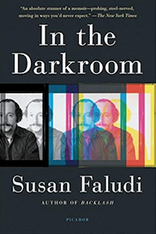A WRITER'S WIT |
My Book World

2016.
One sign that a book may be spectacularly well written is that the author’s process seems inscrutable. In the case of Susan Faludi, she combines journalistic techniques of conducting interviews, whether recorded or not, along with long months, perhaps years of tedious research of all kinds, but finally she observes and interprets the relationship she has (or has not) with her own father. Yet how she weaves all these together remains a wonderful mystery.
Faludi’s memoir is comprised of many things: history of the tragic past of Hungary and Hungarian Jews, how that history informs her father’s life as Steven Faludi, her more recent life as Stefi Faludi; it is a journal of the author’s relationship with her father over many years, even years in which they neither speak nor see one another; it is a book about identity, how one can shapeshift to obscure oneself, whether it is her father’s masquerading as a young Nazi in order to rescue family members from being executed or whether it his change from male to female, whether it is changing one’s name from Friedman to Faludi. Ultimately, the book portrays the long, fraught journey that father and daughter take together, a journey that, at any time could be cut short, but because of some ephemeral formula, manages to continue until the very end, when Stefi’s very substantial constitution finally fails. This body—lying on a hospital bed in Budapest has sustained parental neglect, physical and emotional battles of war, marriage, and family life, abuse it has both endured and afflicted on her daughter, the physical and emotional rigors of gender reassignment surgery—finally succumbs to death. The author has flown from Portland, Oregon, to be with her father Stefi in Budapest, yet Susan sees that her father is resting, she decides she must get some rest at her father’s apartment. She is awakened by a phone call at six a.m. the next morning:
“Hallo,” the voice in the receiver said. “This is Dr. Molnárné.”
Yes, I said, unsure if I was awake or still in a dream.
“I’m sorry to inform you. Your father is dead.”
“What? How could . . . this be?”
“Some time after five this morning.”
“I see,” I said, now alert—and accusatory. “What was the cause?”
“Nothing special,” the doctor said. “She just died” (458).
An astounding book, where echoing off the title, the author takes the reader through many dark rooms, including photographic darkrooms, but others more sinister, to limn the lives of an extraordinary father and her daughter. A must read.



 RSS Feed
RSS Feed